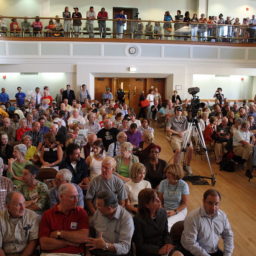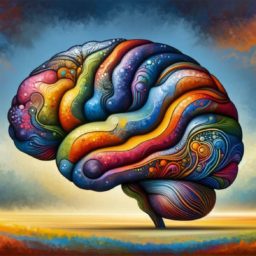
video player How can groups make good decisions? | Mariano Sigman and Dan Ariely Mariano closes this talk with the . You can read the transcript below. Partial Transcript Good collective decisions require two components: deliberation and diversity of opinions. Right now, the way we typically make our voice heard in many societies is through … Continue reading How Can Groups Make Good Decisions? Mariano Sigman and Dan Ariely (2017)

video player The Future of Reasoning | Michael Stevens (Lottocracy) Posts where this video is embedded Democracy’s Spectrum ** From Direct to Representative The Argumentative Theory of Human Reason We did not evolve to reason individually but to reason sociallyVideos: Michael Stevens, Dan Sperber, Hugo MercierThe Future of Reasoning Reason and logic are strugglingTags: confirmation bias (5) … Continue reading The Future of Reasoning Reason and logic are struggling

Gurteen Knowledge Blog May 7, 2021, 15:34I recently came across a fascinating theory concerning the evolution of human reason known as “The Argumentative Theory of Human Reason”. However, I prefer to use the term “theory of social reasoning” or simply “social reasoning”. The theory proposes that the primary function of reason is not to improve our … Continue reading Social Reasoning The Argumentative Theory of Human Reason

Abstract This paper compares the debate quality in the plenary sessions of an Irish Citizens’ Assembly and an Irish parliamentary committee to assess the epistemic effects of public deliberation on a contentious subject: abortion. The unusual occurrence of a similar process of detailed discussion on the same topic in different institutions at around the same … Continue reading Measuring Epistemic Deliberation on Polarized Issues: the Case of Abortion Provision in Ireland Jane Suiter, David M Farrell , Clodagh Harris and Philip Murphy

Executive Summary Overview This report provides an evaluation of Climate Assembly UK (CAUK). This was a citizens’ assembly commissioned by six select committees from the House of Commons: Business Energy and Industrial Strategy (BEIS); Environmental Audit; Housing, Communities and Local Government, Science and Technology; Transport; and Treasury. It was tasked with providing recommendations on how … Continue reading Evaluation of Climate Assembly UK Stephen Elstub, David M. Farrell, Jayne Carrick and Patricia Mockler (2021)

Gurteen Knowledge Blog July 22, 2022, 14:36You may enjoy these three talks by Rory Stewart from the BBC Radio 4 Seriously series of audio documentaries and podcasts. In the talks, Rory looks at the history of argument and explores its importance and the fact that it is the foundation of our democracies and how we make … Continue reading The Long History of Argument A series of talks by Rory Stewart

London Knowledge Café Conversational Collective Intelligence: A New Kind of Democracy Date: Thursday 2nd May 2024 Time: 18:30 to 20:30 BST This is a free event. Please arrive at 6:00 pm or shortly after, allowing you time to settle in and meet other people. Light refreshments will be available. The Café will start promptly at … Continue reading Event: London Knowledge Café: Conversational Collective Intelligence – a New Kind of Democracy Thursday 2nd May 2024

Democracy is a system of government where the power lies with the people. In a democracy, citizens exercise their power through voting in elections to choose their leaders and representatives. All votes are equal, and the candidate or party that gets the most votes wins. Democracy emphasizes active participation – citizens take part in political … Continue reading Democracy’s Spectrum ** From Direct to Representative

Democracy has a rich and complex history that dates back to ancient civilizations. The term itself originates from the Greek words “demos” (people) and “kratos” (power), reflecting its foundational principle of people’s rule. The most celebrated early example of a democratic system is found in ancient Athens in the 5th century BCE. Athenian democracy was … Continue reading Evolution of Democracy **

Citizens, Assemble! Deliberative Democracy in 3 Minutes What is Deliberative Democracy? When Citizens Assemble Posts that link to this post Social Reasoning The Argumentative Theory of Human Reason The Argumentative Theory of Human Reason We did not evolve to reason individually but to reason sociallyBlook Search Search for: Continue reading Deliberative Democracy ** Deliberation is central to decision-making

The argumentative theory of reasoning proposes that reason did not evolve to help us to reason individually but to reason together – in other words, socially. Reasoning is generally seen as the process of thinking about something to help us come to better beliefs and decisions. However, there is substantial evidence that our reasoning process, … Continue reading The Argumentative Theory of Human Reason We did not evolve to reason individually but to reason socially

The wisdom of crowds is the concept that large groups of people are collectively smarter than individuals regarding problem-solving, decision-making, and predicting. However, the method can be improved with the wisdom of crowds of crowds. In the concept of the wisdom of crowds, individuals in a group are privately asked to answer a question, such … Continue reading Wisdom of Crowds of Crowds Crowds within a crowd outperform ‘wisdom of the crowd’








